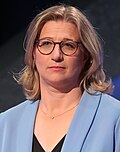Top Qs
Timeline
Chat
Perspective
German order of precedence
Relative preeminence of officials for ceremonial purposes From Wikipedia, the free encyclopedia
Remove ads
The German order of precedence is a symbolic hierarchy of the highest federal offices in Germany used to direct protocol. It has no official status, but has been established in practical use.[1] It consists of the holders or chairs of the five permanent constitutional bodies of the Federation.[a]
- The President of Germany, the head of state of Germany.
- The President of the Bundestag, the speaker of the German parliament, the Bundestag.
- The Chancellor of Germany, the head of the government of Germany.
- (1.) The President of the Bundesrat, the speaker of the Bundesrat, a federal legislative chamber, in which the governments of the sixteen German states are represented. The president of the Bundesrat is ex officio also deputy to the President of Germany (Basic Law, Article 57), thus becomes first in the order, while acting on behalf of the President or while acting as head of state during a vacancy of the presidency.
- The President of the Federal Constitutional Court, the supreme court of Germany.
This article relies largely or entirely on a single source. (March 2023) |
Remove ads
Current office-holders
Remove ads
Living former office-holders
Summarize
Perspective
The order of precedence is also observed with respect to former office-holders in some cases, for example if they participate in official ceremonies as honoured guests.
Former Presidents of Germany
- Christian Wulff (2010–2012)
- Joachim Gauck (2012–2017)
Former Presidents of the Bundestag
- Rita Süssmuth (1988–1998)
- Wolfgang Thierse (1998–2005)
- Norbert Lammert (2005–2017)
- Bärbel Bas (2021–2025)
Former Chancellors of Germany
- Gerhard Schröder (1998–2005)
- Angela Merkel (2005–2021)
- Olaf Scholz (2021–2025)
Former Presidents of the Bundesrat
- Björn Engholm (1988–1989)
- Walter Momper (1989–1990)
- Berndt Seite (1992)
- Oskar Lafontaine (1992–1993)
- Klaus Wedemeier (1993–1994)
- Edmund Stoiber (1995–1996)
- Erwin Teufel (1996–1997)
- Gerhard Schröder (1997–1998)
- Hans Eichel (1998–1999)
- Roland Koch (1999)
- Kurt Beck (2000–2001)
- Klaus Wowereit (2001–2002)
- Dieter Althaus (2003–2004)
- Matthias Platzeck (2004–2005)
- Peter Harry Carstensen (2005–2006)
- Ole von Beust (2007–2008)
- Peter Müller (2008–2009)
- Jens Böhrnsen (2009–2010)
- Hannelore Kraft (2010–2011)
- Horst Seehofer (2011–2012)
- Winfried Kretschmann (2012–2013)
- Stephan Weil (2013–2014)
- Volker Bouffier (2014–2015)
- Stanislaw Tillich (2015–2016)
- Malu Dreyer (2016–2017)
- Michael Müller (2017–2018)
- Daniel Günther (2018–2019)
- Dietmar Woidke (2019–2020)
- Reiner Haseloff (2020–2021)
- Bodo Ramelow (2021–2022)
- Peter Tschentscher (2022–2023)
- Manuela Schwesig (2023–2024)
Former Presidents of the Federal Constitutional Court
- Hans-Jürgen Papier (2002–2010)
- Andreas Voßkuhle (2010–2020)
Remove ads
Notes
- The two non-permanent constitutional bodies, the Federal Convention and the Joint Committee, are headed by the President of the Bundestag in personal union.
References
Wikiwand - on
Seamless Wikipedia browsing. On steroids.
Remove ads









